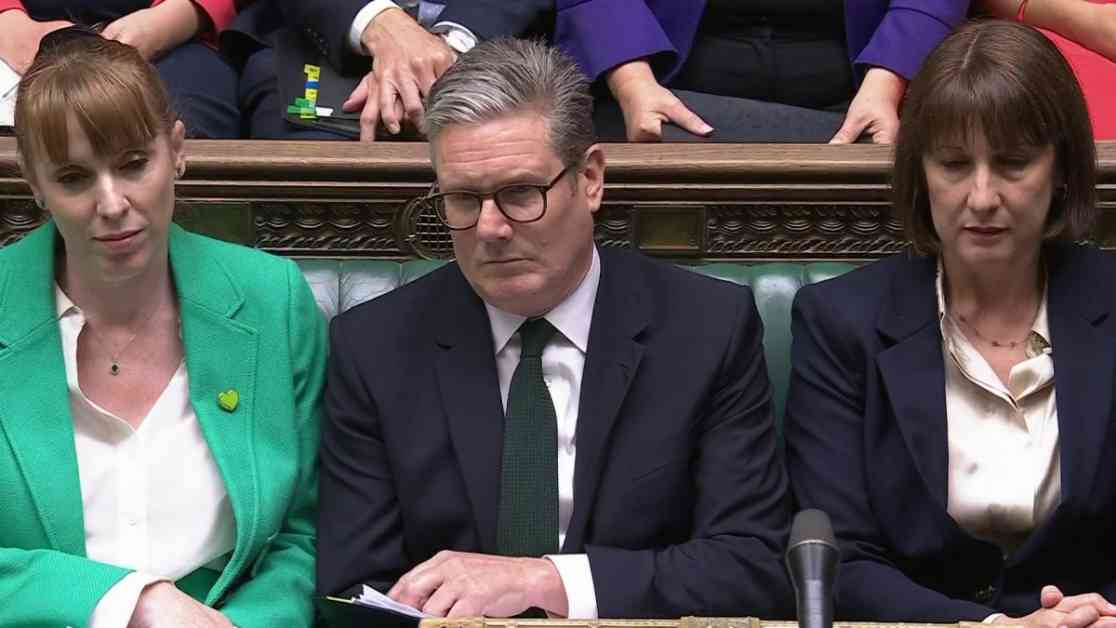Sir Keir Starmer recently faced a significant challenge to his leadership as Members of Parliament voted on a contentious issue related to winter fuel payments for pensioners. The vote centered around a proposal to cut winter fuel payments for approximately 10 million pensioners who do not receive pension credit. Ultimately, MPs voted 348 to 228 against a Conservative motion that sought to block the cut, resulting in the Government successfully defending its position by a margin of 120 votes, despite their smaller majority of 167.
The Prime Minister, addressing the Trade Union Conference in Brighton, defended the Government’s stance on the issue, stating that tough decisions were necessary to ensure economic stability and address a significant financial gap in public finances amounting to £22 billion. The decision to restrict winter fuel payments to pensioners receiving pension credit or other benefits was framed as a crucial step in rebuilding public services and managing the country’s financial resources effectively.
The debate surrounding the winter fuel payments cut has garnered significant attention, with many MPs feeling the pressure from their constituents on the matter. While some individuals have expressed understanding of the need for difficult decisions, there is also a sense of concern and urgency among the public. This issue has raised genuine worries among pensioners and their families, highlighting the importance of addressing the challenges faced by vulnerable groups in society.
Prior to the vote, Shadow Work and Pensions Secretary Mel Stride made a heartfelt appeal to Labour MPs to consider the implications of the proposed cut. He emphasized the potential hardships that could arise for millions of elderly and vulnerable individuals across the country if the measure were to be implemented. The call to action urged Labour MPs to vote against the cut and stand in solidarity with the opposition to protect the winter fuel allowance for those in need.
One of the key factors contributing to the complexity of the issue is the confusion surrounding eligibility criteria for pension credit. Recent Treasury analysis indicated that a significant number of pension credit applications have been rejected since 2019, highlighting the need for clarity and accessibility in the application process. Additionally, Chancellor Rachel Reeves’ announcement in July to revise the eligibility criteria for the winter fuel payment further underscored the importance of ensuring equitable access to essential benefits for all eligible individuals.
Despite the challenges and uncertainties surrounding the winter fuel payment cut, it is essential for MPs to consider the impact of their decisions on the most vulnerable members of society. The welfare of pensioners and other at-risk populations must remain a priority in policy-making and legislative actions to ensure a fair and just society for all.
MP Voting Records on Winter Fuel Payment Cut
The outcome of the recent vote on the winter fuel payment cut highlighted the diverse positions taken by MPs across different political parties. While the majority of Labour MPs supported the Government’s plan to restrict the winter fuel allowance to pension credit recipients, a significant number of MPs from various parties opposed the measure. The breakdown of MPs’ voting records provides valuable insights into the diversity of opinions and priorities within the Parliament.
Labour MPs’ Stance on the Winter Fuel Payment Cut
Among Labour MPs, the majority backed the Government’s plan to limit the winter fuel allowance to pension credit recipients. This decision reflects the party’s commitment to addressing the financial challenges facing the country and ensuring economic stability in the long run. However, a small group of Labour MPs chose to vote against the cut, expressing concerns about the potential impact on vulnerable individuals and the need for a more inclusive approach to welfare policies. The differing perspectives within the Labour Party underscore the complexity of the issue and the importance of balancing economic considerations with social welfare priorities.
Conservative and Other Party MPs’ Positions
On the other hand, Conservative MPs and those from smaller parties also took a stand on the winter fuel payment cut, with a significant number opposing the Government’s proposal. The decision to vote against the cut reflected their commitment to protecting the welfare of pensioners and ensuring equitable access to essential benefits for all eligible individuals. The diversity of opinions among MPs from different political backgrounds highlights the nuanced nature of the debate and the need for comprehensive policy solutions that prioritize the well-being of vulnerable populations.
In conclusion, the recent vote on the winter fuel payment cut has sparked important discussions and debates within the Parliament, shedding light on the complex challenges facing pensioners and other vulnerable individuals in society. The diverse range of opinions and positions taken by MPs reflects the multifaceted nature of the issue and the need for collaborative efforts to address the underlying concerns effectively. As the Government moves forward with its policy agenda, it is crucial for MPs to remain vigilant and attentive to the needs of the most vulnerable members of society, ensuring that welfare policies are fair, inclusive, and supportive of those in need.













